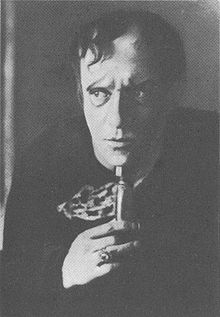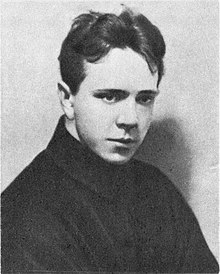Michael Chekhov
Mikhail Aleksandrovich "Michael" Chekhov (Template:Lang-ru, 29 August 1891 – 30 September 1955) was a Russian-American actor, director, author, and theatre practitioner. His acting technique has been used by actors such as Jack Nicholson, Clint Eastwood, Marilyn Monroe, and Yul Brynner. Konstantin Stanislavski referred to him as his most brilliant student. He was a nephew of the playwright Anton Chekhov.
Although mainly a stage actor, he made a few notable appearances on film, perhaps most memorably as the Freudian analyst in Alfred Hitchcock's Spellbound (1945), for which he received his only Academy Award nomination.
Life
He was born in Saint Petersburg the son of Alexander Chekhov (the elder brother of Anton Chekhov) and his wife Natalya Golden. It was his father's second marriage his mother, a Russian Jew, having been the governess to his children from his first marriage. He was raised in a middle-class family his father being in the Imperial Customs Service as well as a moderately successful writer. Chekhov's first wife (1914–1917) was actress Olga Chekhova born Knipper, whom he met at the MAT First Studio. (She was named after her aunt, the wife of Anton Chekhov.) Their daughter, also baptized Olga, was born in 1916, she became a German actress under the name Ada Tschechowa. Olga Chekhova was a daughter of Konstantin Knipper and the niece and namesake of Olga Knipper, Anton Chekhov's wife. His second wife was Xenia Ziller, of German origins. [citation needed]
Chekhov was considered by the Russian theatre practitioner Konstantin Stanislavski to be one of his brightest students. He studied under Stanislavski at the First Studio of the Moscow Art Theatre, where he acted, directed, and studied Stanislavski's 'system'. When Chekhov experimented with affective memory and had a nervous breakdown, this aided Stanislavski in seeing the limitations of his early concepts of emotional memory. He later led the company whose studio he named Second Moscow Art Theatre. [citation needed]
After the October Revolution, Chekhov split with Stanislavski and toured with his own company. He thought that Stanislavski’s techniques led too readily to a naturalistic style of performance. He demonstrated his own theories in parts as Senator Ableukhov in the stage version of Andrei Bely's Petersburg. In the late 1920s, Chekhov emigrated to Germany and set up his own studio, teaching a physical and imagination-based system of actor training. He developed the use of the "Psychological Gesture", a concept derived from the Symbolist theories of Bely. Stanislavski came to regard Chekhov's work as a betrayal of his principles. [citation needed]
In this technique, the actor physicalizes a character’s need or internal dynamic in the form of an external gesture. Subsequently, the outward gesture is suppressed and incorporated internally, allowing the physical memory to inform the performance on an unconscious level. Between 1930-1935 he worked in Kaunas State Drama Theatre in Lithuania. Between 1936 and 1939 Chekhov established The Chekhov Theatre School at Dartington Hall, in Devon, England. Following developments in Germany that threatened the outbreak of war he moved to the USA with the couple, and later writers, Anne Cumming and Henry Lyon Young to recreate a drama school.[1]
Career

Following Stanislavski's approach, much of what Chekhov explored addressed the question of how to access the unconscious creative self through indirect non-analytical means. [citation needed] Chekhov taught a range of movement dynamics such as molding, floating, flying, and radiating that actors use to find the physical core of a character. [citation needed]
Despite his seemingly external approach, Chekhov's techniques were meant to lead the actor to a rich internal life. In spite of his brilliance as an actor and his first-hand experience in the development of Stanislavski's groundbreaking work, Chekhov as a teacher was overshadowed by his American counterparts in the 1940s and 1950s and their interpretations of Stanislavski's 'system,' which became known as Method acting.[citation needed] Interest in Chekhov's work has grown, however, with a new generation of teachers. Chekhov's own students included Marilyn Monroe, Anthony Quinn, Clint Eastwood, Dorothy Dandridge, Mala Powers, Yul Brynner, Patricia Neal, Sterling Hayden, Jack Palance, Elia Kazan, Robert Lewis, Paula Strasberg, Guy Gillette, and Lloyd and Dorothy Bridges.[2] In the television programme Inside the Actors Studio, noted actors such as Johnny Depp and Anthony Hopkins have cited Chekhov's book as highly influential on their acting. Beatrice Straight also thanked Chekhov in her acceptance speech after winning her Oscar for her performance in Network (1976).[3]
Chekhov's description of his acting technique, On the Technique of Acting, was written in 1942. When reissued in 1991 it had additional material by Chekhov estate executor Mala Powers; an abridged version appeared under the title To the Actor in 1953, with a preface by Yul Brynner, and reissued in 2002 with an additional foreword by Simon Callow and additional Russian material translated and commented on by Andrei Malaev-Babel. [who?] The English translation of his autobiography The Path of the Actor was edited by Andrei Kirillov and Bella Merlin and published by Routledge in 2005, marking the 50th anniversary of his death. Some of Chekhov's lectures are available on CD under the title On Theatre and the Art of Acting. The documentary From Russia to Hollywood: the 100 Year Odyssey of Chekhov and Shdanoff, profiles Chekhov and his fellow Russian associate George Shdanoff; released in 1998, it is narrated by Mala Powers and Gregory Peck, who starred in Alfred Hitchcock's Spellbound, for which Chekhov earned an Oscar nomination. [citation needed]
Selected filmography

| Year | Film | Role | Notes |
|---|---|---|---|
| 1914 | Kogda zvuchat struny serdtsa | ||
| 1915 | Shkaf s surprizom | ||
| 1916 | Liubvi syurprizy tshchetnye | ||
| 1921 | Erik XIV | Erik XIV | |
| 1927 | Einer gegen alle | ||
| 1927 | Man from the Restaurant | Skorokhodov | |
| 1929 | Der Narr seiner Liebe | Didier Mireuil | |
| 1930 | Phantoms of Happiness | Jacques Bramard | |
| 1930 | Troika | Paschka, village idiot | |
| 1944 | Song of Russia | Ivan Stepanov | |
| 1944 | In Our Time | Uncle Leopold Baruta | |
| 1945 | Spellbound | Dr. Alexander 'Alex' Brulov | |
| 1946 | Specter of the Rose | Max Polikoff | |
| 1946 | Cross My Heart | Peter | |
| 1946 | Abie's Irish Rose | Solomon Levy | |
| 1948 | Texas, Brooklyn and Heaven | Gaboolian | |
| 1952 | Invitation | Dr. Fromm | |
| 1952 | Holiday for Sinners | Dr. Konndorff | |
| 1954 | Rhapsody | Professor Schuman | (Last appearance) |
Bibliography
- Чехов, Михаил. Литературное наследие: В 2 т. / Общ. науч. ред. М.О. Кнебель; сост.: И.И. Аброскина, М.С. Иванова, Н.А. Крымова; коммент. И.И. Аброскиной, М.С. Ивановой. М., 1995.
References
- ^ "Obituary: Anne Cumming". The Independent. 31 August 1993. Retrieved 12 April 2017.
- ^ McLellan, Dennis (21 February 2009). "Dorothy Bridges dies at 93; 'the hub' of an acting family". Los Angeles Times. Retrieved 23 April 2009.
- ^ Beatrice Straight Wins Supporting Actress: 1977 Oscars at YouTube
Further reading
- Farber, Vreneli, Stanislavsky in Practice: Actor Training in Post-Soviet Russia (Artists & Issues in the Theatre, Vol. 16) New York: Peter Lang, 2008. (summary of M. Chekhov's system and its application in post-Soviet actor training) ISBN 978-1-4331-0315-5
- Евгений Вахтангов. Документы и свидетельства: В 2 т. / Ред.-сост В.В. Иванов; ред. М.В. Львова, М.В. Хализева. М.: Индрик, 2011. Т. 1 – 519 с., илл.; Т. 2 – 686 с., илл.
- Евгений Вахтангов в театральной критике / Ред.-сост. В.В. Иванов. М.: Театралис, 2016. – 703 с.; илл.
- Иванов В.В. Евгений Вахтангов и Михаил Чехов. Игра на краю, или Театральный опыт трансцендентального// Русский авангард 1910-1920-х годов и проблема экспрессионизма/ Редколлегия: Г.Ф. Коваленко и др. М.; Наука, 2003.
- Лекции Рудольфа Штайнера о драматическом искусстве в изложении Михаила Чехова. Письма к В.А. Громову. Публ. С.В. Казачкова и Т.Л. Стрижак. Вступ. текст В.В. Иванова. Коммент. С.В. Казачкова, Т.Л. Стрижак и В.Г. Астаховой // Мнемозина. Документы и факты из истории отечественного театра ХХ века / Ред.-сост. В.В. Иванов. Вып. 2. М.: УРСС, 2000. С. 85–142.
- «Зритель – лицо всегда загадочное для артиста…» Письма зрителей, читателей и коллег Михаилу Чехову. Публ., вступит. статья и коммент. М.В. Хализевой // Мнемозина. Документы и факты из истории отечественного театра XX века / Ред.-сост. В.В. Иванов. Вып. 4. М.: Индрик, 2009. С. 585–616.
External links
- Michael Chekhov at IMDb
- Michael Chekhov at the TCM Movie Database
- Michael Chekhov at the Internet Broadway Database
- National Michael Chekhov Association
- Michael Chekhov in Russia
- Michael Chekhov International Center
- Michael Chekhov and The Psychological Gesture
- The Actor is the Theatre: a collection of Michael Chekhov's unpublished notes and manuscripts on the art of acting and the theatre: typescript, 1977, held by the Billy Rose Theatre Division, New York Public Library for the Performing Arts
- Use dmy dates from April 2011
- 1891 births
- 1955 deaths
- Acting theorists
- American people of Russian descent
- American male film actors
- American male silent film actors
- Burials at Forest Lawn Memorial Park (Hollywood Hills)
- Drama teachers
- Moscow Art Theater
- People from Saint Petersburg
- People from Saint Petersburg Governorate
- Russian male film actors
- Russian male silent film actors
- Russian male stage actors
- Russian theatre directors
- Theatre directors from Saint Petersburg
- Theatre practitioners
- 20th-century American male actors
- Imperial Russian emigrants to Germany
- Imperial Russian emigrants to the United States
- American people of Russian-Jewish descent

